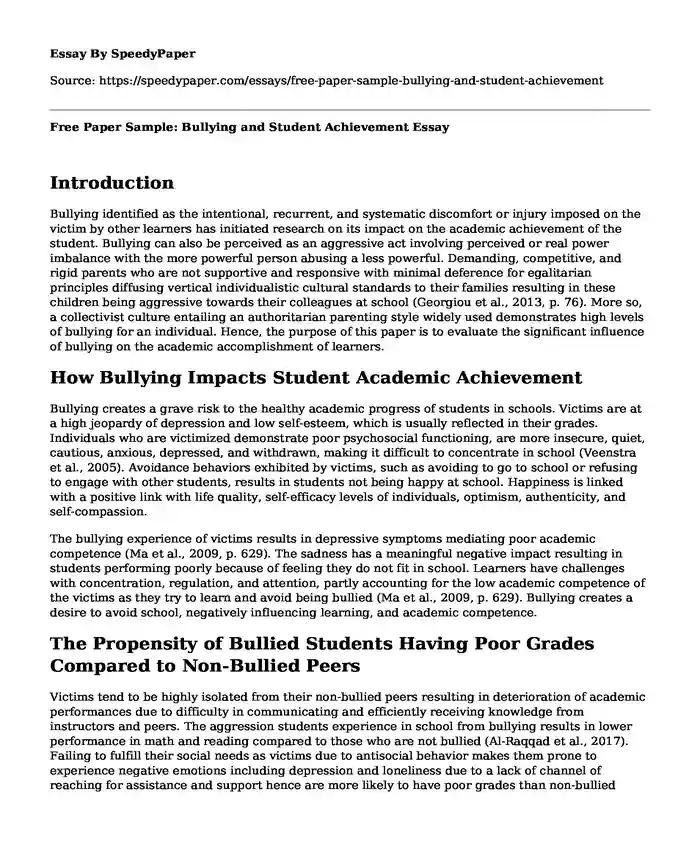
| Type of paper: | Essay |
| Categories: | Psychology Students Bullying |
| Pages: | 3 |
| Wordcount: | 768 words |
Introduction
Bullying identified as the intentional, recurrent, and systematic discomfort or injury imposed on the victim by other learners has initiated research on its impact on the academic achievement of the student. Bullying can also be perceived as an aggressive act involving perceived or real power imbalance with the more powerful person abusing a less powerful. Demanding, competitive, and rigid parents who are not supportive and responsive with minimal deference for egalitarian principles diffusing vertical individualistic cultural standards to their families resulting in these children being aggressive towards their colleagues at school (Georgiou et al., 2013, p. 76). More so, a collectivist culture entailing an authoritarian parenting style widely used demonstrates high levels of bullying for an individual. Hence, the purpose of this paper is to evaluate the significant influence of bullying on the academic accomplishment of learners.
How Bullying Impacts Student Academic Achievement
Bullying creates a grave risk to the healthy academic progress of students in schools. Victims are at a high jeopardy of depression and low self-esteem, which is usually reflected in their grades. Individuals who are victimized demonstrate poor psychosocial functioning, are more insecure, quiet, cautious, anxious, depressed, and withdrawn, making it difficult to concentrate in school (Veenstra et al., 2005). Avoidance behaviors exhibited by victims, such as avoiding to go to school or refusing to engage with other students, results in students not being happy at school. Happiness is linked with a positive link with life quality, self-efficacy levels of individuals, optimism, authenticity, and self-compassion.
The bullying experience of victims results in depressive symptoms mediating poor academic competence (Ma et al., 2009, p. 629). The sadness has a meaningful negative impact resulting in students performing poorly because of feeling they do not fit in school. Learners have challenges with concentration, regulation, and attention, partly accounting for the low academic competence of the victims as they try to learn and avoid being bullied (Ma et al., 2009, p. 629). Bullying creates a desire to avoid school, negatively influencing learning, and academic competence.
The Propensity of Bullied Students Having Poor Grades Compared to Non-Bullied Peers
Victims tend to be highly isolated from their non-bullied peers resulting in deterioration of academic performances due to difficulty in communicating and efficiently receiving knowledge from instructors and peers. The aggression students experience in school from bullying results in lower performance in math and reading compared to those who are not bullied (Al-Raqqad et al., 2017). Failing to fulfill their social needs as victims due to antisocial behavior makes them prone to experience negative emotions including depression and loneliness due to a lack of channel of reaching for assistance and support hence are more likely to have poor grades than non-bullied peers. Also, students in classes with excess verbal or physical violence performance are much less than those in classrooms that are less violent (Al-Raqqad et al., 2017).
The psychological isolation of victims can be associated with experiencing isolation in social circles and classrooms, forcing them to have an internal conflict due to the struggle to adjust their psychological state and mindset all through the learning process. More so, the academic performance of victims in school is poor as they seek to evade attending school classrooms for the reason of evading victimization (Al-Raqqad et al., 2017). The experience of victimization results in minimal academic performance and results in absenteeism as they do not feel the need to study anymore (Al-Raqqad et al., 2017). The psychological issues due to stress in studying primarily from bullying lead to challenges in functioning properly in school.
References
Al-Raqqad, H. K., Al-Bourini, E. S., Al Talahin, F. M., & Aranki, R. M. (2017). The impact of school bullying on students’ academic achievement from teachers point of view. International Education Studies, 10(6), 44. https://doi.org/10.5539/ies.v10n6p44
Georgiou, S. N., Fousiani, K., Michaelides, M., & Stavrinides, P. (2013). Cultural value orientation and authoritarian parenting as parameters of bullying and victimization at school. International Journal of Psychology, 48(1), 69-78. https://doi.org/10.1080/00207594.2012.754104
Ma, L., Phelps, E., Lerner, J. V., & Lerner, R. M. (2009). The development of academic competence among adolescents who bully and who are bullied. Journal of Applied Developmental Psychology, 30(5), 628-644. https://doi.org/10.1016/j.appdev.2009.07.006
Veenstra, R., Lindenberg, S., Oldehinkel, A. J., De Winter, A. F., Verhulst, F. C., & Ormel, J. (2005). Bullying and victimization in elementary schools: A comparison of bullies, victims, bully/victims, and uninvolved preadolescents. Developmental Psychology, 41(4), 672-682. https://doi.org/10.1037/0012-1649.41.4.672
Cite this page
Free Paper Sample: Bullying and Student Achievement. (2023, Nov 04). Retrieved from https://speedypaper.com/essays/free-paper-sample-bullying-and-student-achievement
Request Removal
If you are the original author of this essay and no longer wish to have it published on the SpeedyPaper website, please click below to request its removal:
- Free Essay: The Effects of Child Abuse on Social and Emotional Development
- Free Essay with the Anti-Sexual Harassment Campaign Analysis
- Admission Essay Sample
- Personal Experience of Organizations and People. Essay Sample.
- Free Paper on Determinants of Aggressive Behavior - Social Psychology Article Review
- Free Paper on APA's General Principles of Ethics and Ethical Dilemmas
- Free Essay Sample on Anthropologist Racism
Popular categories




